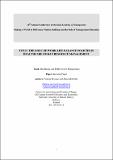| dc.contributor.author | Browne, Patricia | |
| dc.contributor.author | McCarthy, Alma | |
| dc.date.accessioned | 2013-07-08T15:42:27Z | |
| dc.date.available | 2013-07-08T15:42:27Z | |
| dc.date.issued | 2011 | |
| dc.identifier.citation | Browne, P. & McCarthy, A. (2011) "The role of work-life balance policies in healthcare human resources management". 14th Annual Conference of the Irish Academy of Management - Making a World of Difference: Nation Building and the Role of Management Education. | en_US |
| dc.identifier.uri | http://hdl.handle.net/10379/3502 | |
| dc.description.abstract | Currently a European wide study has surveyed some 1,406 nurses in 115 units within over 30 hospitals as part of a longer study. This study looks at nurses' qualifications, productivity, their working environment as well as nurse retention (Donnellan, 2010). Work-life balance policies forms part of the HRM mandate. 'Work-life balance means that individuals have successfully segmented or integrated life and work so as to achieve a satisfying quality of life, overall satisfaction and less strain or stress around juggling conflicting role demands' (Blyton et al., 2006: 2). This establishes what WLB should aim to achieve for individuals in organisations. Whether this is achieved often is dependant on both choices provided and the extent they are availed of by individuals.
Gambles et al. states that "the choices of the few can impact negatively on 'choices', well-being and equity experienced by the many, even if this is not the intention of the person working long hours"(2006:53). How can work-life balance policies be introduced effectively then? Jones et al. (2006) notes that the salience of work-life balance initiatives would increase by positioning family-friendly practices and other work-life initiatives as strategic human resource management (SHRM) practices.
This paper will explore the reasons for investigating family-friendly and work-life balance practices in healthcare organisations. The positive impact these have for both individuals working in the field and to the quality of services they help to provide collectively will be examined. The paper will provide a conceptual model of the antecedents of work-life balance programmes and discuss recommendations for research and analysis in a specific healthcare context. | en_US |
| dc.format | application/pdf | en_US |
| dc.language.iso | en | en_US |
| dc.rights | Attribution-NonCommercial-NoDerivs 3.0 Ireland | |
| dc.rights.uri | https://creativecommons.org/licenses/by-nc-nd/3.0/ie/ | |
| dc.subject | Work-life Balance | en_US |
| dc.subject | Healthcare | en_US |
| dc.subject | Public Sector | en_US |
| dc.subject | Policies | en_US |
| dc.subject | Nurses | en_US |
| dc.title | The role of work-life balance policies in healthcare human resources management | en_US |
| dc.type | Working Paper | en_US |
| dc.description.peer-reviewed | non-peer-reviewed | en_US |
| nui.item.downloads | 2423 | |


